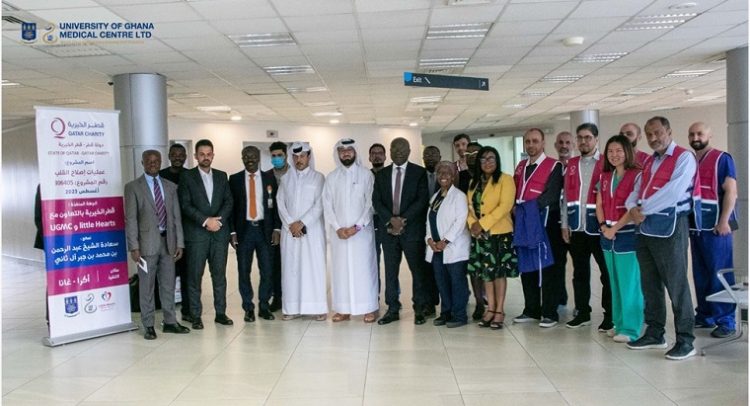The QC and UGMC teams with the medical specialists
Qatar Charity (QC) Ghana, a non-governmental, non-profit humanitarian organisation,has launched an initiative to offer free surgeries for 35 needy children with congenital heart defects.
The initiative, which is being undertaken in collaboration with the University of Ghana Medical Centre (UGMC) and other donor partners, will see the utilisation of minimally invasive procedures by a team of nine medical specialists from USA, Canada, Qatar and Jordan to correct the heart defects and give patients a better life.
QC Director, Ghana Office, Hassan Owda, said the initiative is part of the broader health programme consisting of congenital heart diseases, cleft palate and cataract removal surgeries for needy people.
“The 35 children that will benefit from this project is the first step because their conditions are complicated and are often treated outside of the country,” he said.
He indicated that due to the sophisticated nature of the initiative, the organisation started the mobilisation with UGMC last November, identifying more than 70 cases, and, “our expert team did a diagnosis and now we have admitted 28 and we are going to continue the diagnosis to admit the rest to make up the 35.”
Director of Programmes and International Development, QC, Abdulaziz Jassim Hejji, said QC is proud to be at the forefront of a flagship initiative.
He reaffirmed Qatar Charity’s commitment to aligning its programmes to that of the government aimed at helping needy Ghanaians.
“In line with this commitment, QC has in the past, organised several health campaigns for the proactive screening and sustainable management of diseases like diabetes, hypertension, fistula, cataract, and cleft lip,” he said.
Medical Director, UGMC, Dr. Kwame Anim-Boamah said about one in every 100 children suffer from a congenital heart defect which costs about $3,000 to $ 5,000 to treat.
He, therefore, expressed appreciation to Qatar Charity for being magnanimous and gracious to support UGMC to offer free surgeries to the needy children.
“Some of these children have been waiting for quite some time to have the problems fixed. And what is also exciting about this mission is that this is going to be through non-invasive, or minimally invasive, procedure,” he said. “That means the patients will recover faster, and so this offers us a unique opportunity to help these children.”
By Jamila Akweley Okertchiri


